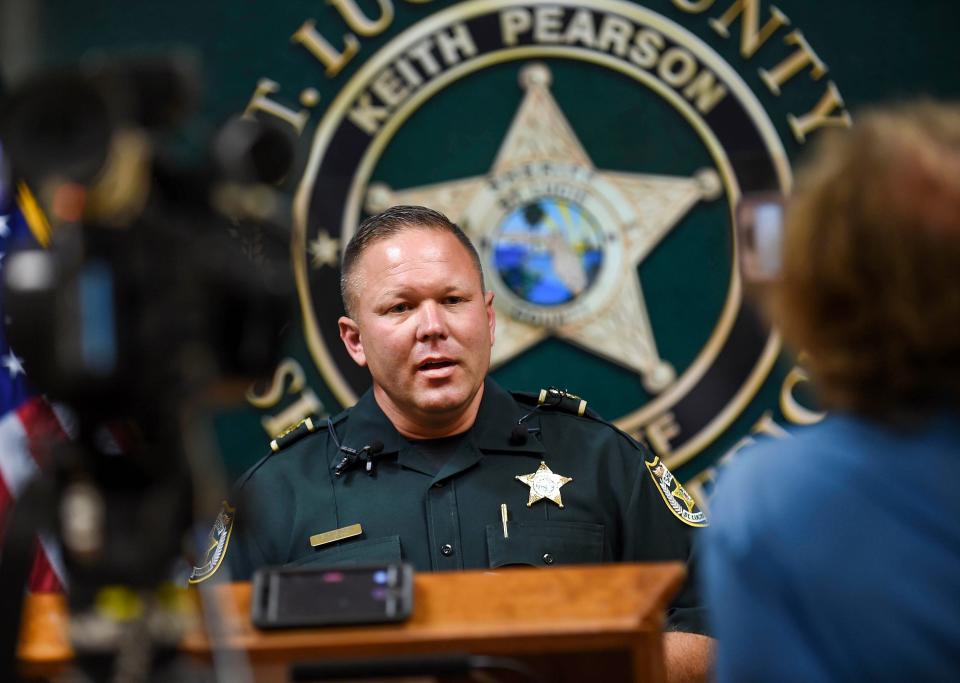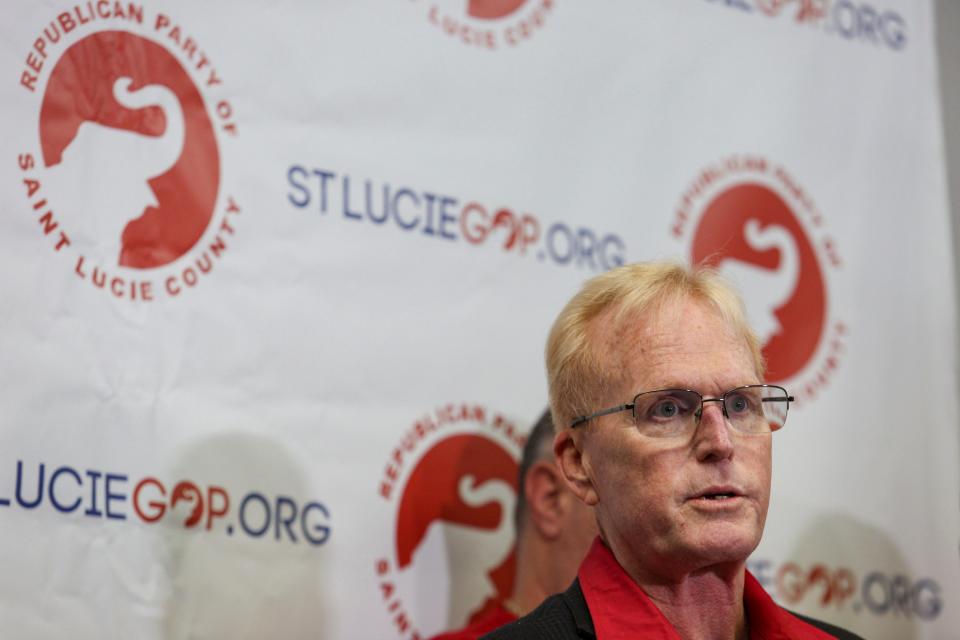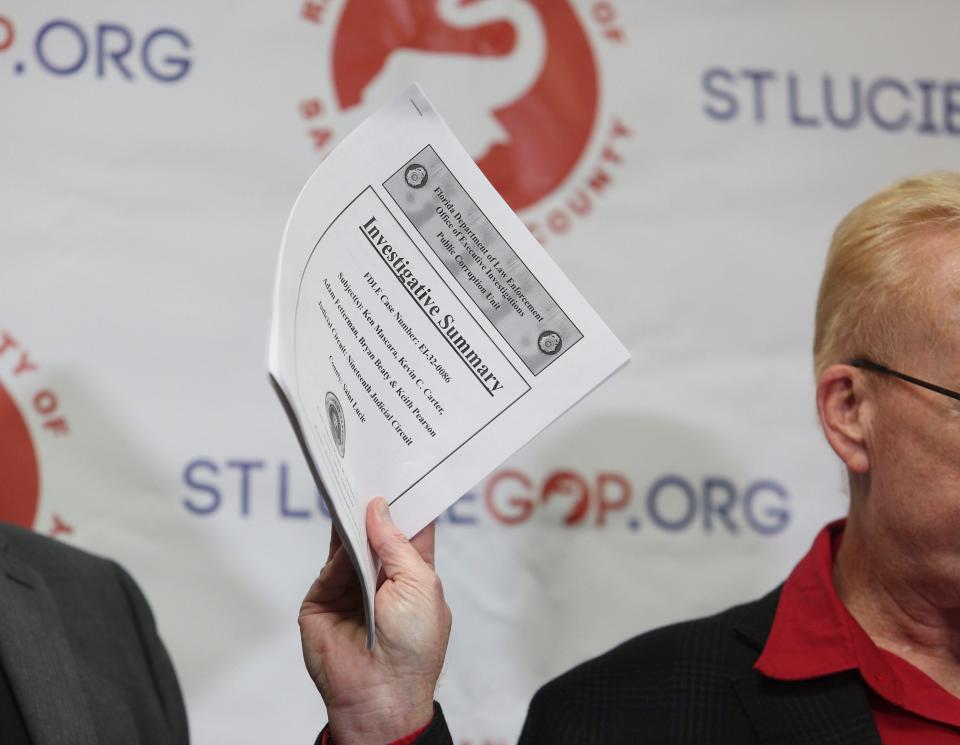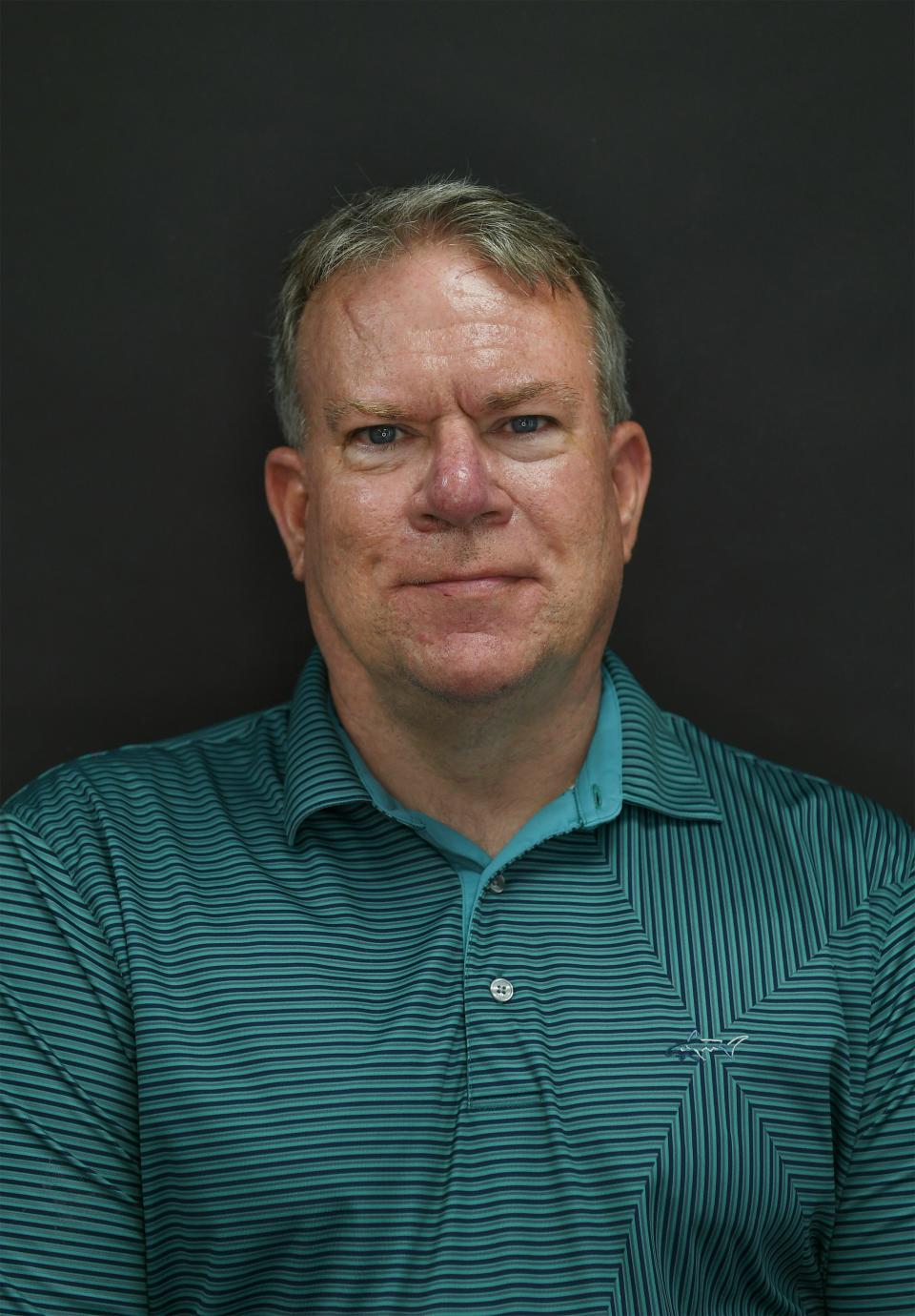How St. Lucie Republicans could get stuck with Keith Pearson as their nominee for sheriff
- Oops!Something went wrong.Please try again later.
There are many unanswered questions about Keith Pearson's sudden promotion to St. Lucie County sheriff, but one point is very clear: The local Republican Party leadership doesn't want him to be its nominee for the job next year.
Unfortunately, due to the way Florida's election laws are written, the party might get stuck with him.
And that illustrates why the laws need to be changed, for the future benefit of Republicans and Democrats alike.
Why Republicans are outraged

Kenny Nail, chairman of the St. Lucie County Republican Party's executive committee, sounded the alarm last week, just a day after Pearson filed paperwork to run in next year's Republican primary.
The executive committee asked Gov. Ron DeSantis to reconsider his decision to appoint Pearson as an interim replacement to the post, following the abrupt resignation of longtime Sheriff Ken Mascara Dec. 1.
Instead, Nail suggested DeSantis appoint Richard Del Toro, Port St. Lucie's interim police chief, as the sheriff's office's interim leader ahead of the 2024 elections.
At a news conference Wednesday, Nail also asked DeSantis to open an ethics investigation into Pearson's role in helping Mascara recruit and support a "ghost candidate" in the 2020 Republican primary, prior to Mascara's last re-election bid.
Given that the party leadership took the somewhat-unusual step of endorsing Del Toro for the sheriff's post last year, it's not a huge surprise Pearson's plans to compete against him in the August primary weren't welcomed.
The party's rules, similar to those of their Democratic counterparts, allow endorsements of candidates before the primaries are held. However, the endorsed candidates aren't guaranteed a party's nomination.
A sneaky way to gain a political advantage

There were already two other candidates vying for the Republican nomination ― Preston Michael DiFrancesco and Rich Williams ― before Pearson decided to get into the race.
But it's the way Pearson is entering this race that suggests some shenanigans took place.
Pearson claimed to have been taken by surprise by DeSantis' decision to appoint him to the interim job late on a Friday afternoon. The appointment allegedly happened within an hour of when Mascara notified the governor of his plans to step down.
By the following Monday afternoon, Pearson had swapped out Mascara's name for his own on signage at the sheriff's headquarters (do sign installers work weekends?) and filed his qualifying paperwork with the St. Lucie County Supervisor of Elections Office.
The timeline for how all this supposedly went down strains credibility. But other than doing what they've already done, the local Republican leaders apparently have few cards left to play.
With only about a year remaining in Mascara's unexpired term, DeSantis clearly has the authority to pick an interim replacement rather than calling for a special election.
And, even though serving as sheriff on an interim basis will give Pearson an advantage over Del Toro, the committee's preferred nominee, Nail acknowledged it's within the law for DeSantis to have acted as he did.
Primary election laws need checks and balances

To qualify as a candidate in a partisan primary in Florida, someone must be registered with that party at least one year ahead of time. Pearson meets that criteria.
So even though Pearson seems to have colluded with DeSantis, a Republican, and Mascara, a Democrat, to gain an electoral advantage, there's no mechanism in the law for the party to kick him off the ballot.
Which doesn't make it right.
"Yes, there should be checks and balances," Nail told me last week.
The system allows voters to ultimately decide who each party's nominees will be. However, it seems reasonable to give parties some measure of control over who represents them.
Nail said he would be uncomfortable with a provision that would allow "the party elite" to unilaterally disqualify a candidate from a primary ballot. However, he said there should be some mechanism ― perhaps a process to petition a judge if two-thirds of a party's executive committee members agreed ― if a candidate's partisan credentials were in question.
If Pearson somehow wins the Republican nomination, expect Democrats to have a field day quoting the Florida Department of Law Enforcement investigation suggesting he and Mascara helped Kevin Carter beat Williams in the 2020 Republican primary, because Mascara didn't want to face Williams in the general election.
It's easy to imagine other scenarios where the one-year registration rule could be abused. Say, for example, liberal firebrand Congresswoman Alexandria Ocasio-Cortez decided to relocate from New York to Florida and register as a Republican voter.
After a year in political purgatory, she would be eligible to run in Republican primaries. Whether she could win would be up to the voters, but even if winning were not her goal, she might potentially act as a spoiler to prevent other candidates from getting elected.
Or what if someone with a criminal or ethical issues, or ties to Nazis or the Ku Klux Klan, wanted to run for a party's nomination? Shouldn't the party have some say-so about that?
Democrats are probably laughing at the predicament St. Lucie County's Republicans find themselves in now, but Florida's current laws could just as easily be used to game their primaries at some point in the future.
Democrats, it could happen to you, too

It would be smart for leaders from both political parties to come up with a legislative fix that would help ensure Republicans run in Republican primaries and Democrats run in Democratic primaries.
It may be too late to close this loophole before next year's primary season, but a proactive approach could avoid future skullduggery.
This column reflects the opinion of Blake Fontenay. Contact him via email at blake.fontenay@tcpalm.com or at 772-232-5424.
This article originally appeared on Treasure Coast Newspapers: Here's how Keith Pearson is gaming Florida's primary election system

